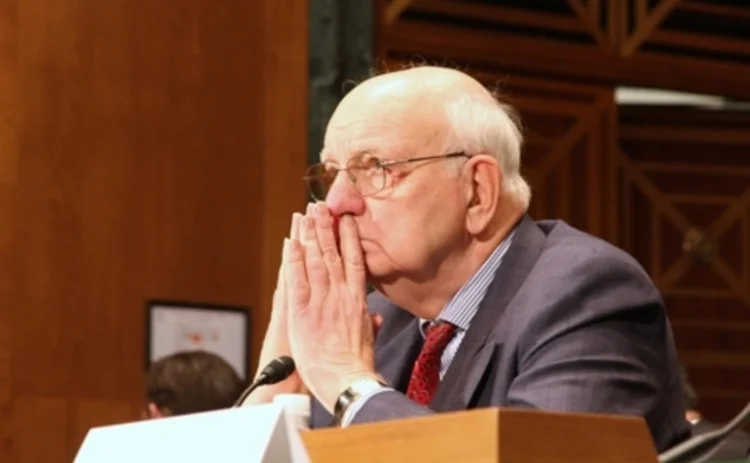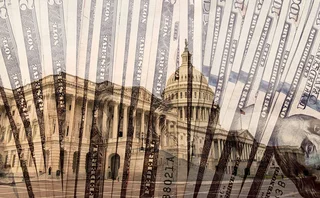
Volcker: Regulatory split creates ‘indecision and stalemate’

US legislators were wrong to retain a split in supervisory responsibilities between multiple agencies, and the resulting structure agreed in the Dodd-Frank Act is "a recipe for indecision, for neglect and for stalemate", says Paul Volcker, former chairman of the Federal Reserve.
Addressing the Economic Club of New York yesterday, Volcker criticised congressional leaders for failing to seize the opportunity to overhaul a regulatory framework that is currently split between six different supervisory authorities.
"It was recognised that the Federal Reserve was ineffective in the run-up to the financial crash. Nonetheless, the Dodd-Frank Act implicitly reinforced the Federal Reserve's supervisory authority. I think it's clear now that the regulatory landscape has been little changed, and the result is we have been left with a half a dozen regulatory agencies involved in banking and finance. They all have their own mandate, their own institutional loyalties, their own support networks in the Congress, along with an ever growing cadre of lobbyists equipped with the capacity to provide campaign finance," said Volcker.
The vast majority of the Dodd-Frank reforms fall under the jurisdiction of six regulatory entities: the Commodity Futures Trading Commission (CFTC), the Federal Deposit Insurance Corporation, the Federal Reserve, the Office of the Comptroller of the Currency (OCC), the Securities and Exchange Commission (SEC) and the US Department of the Treasury.
While Dodd-Frank did eliminate one regulator by folding the Office of Thrift Supervision into the OCC, the act spawned three additional bureaucracies by spinning consumer protection responsibility out of the Federal Reserve and into an independent Consumer Financial Protection Bureau, and establishing a new Financial Stability Oversight Council that will also house a new Office of Financial Research.
The regulatory overlaps and loopholes present a wonderful obstacle course that plays into the hands of lobbyists that resist change
Outside of the banking sector, other regulatory agencies charged with enforcing elements of Dodd-Frank include the Federal Energy Regulatory Commission, the Federal Housing Finance Agency, the Government Accountability Office, the Municipal Securities Rulemaking Board, the National Credit Union Administration Board, as well as the US Department of Education and state governments.
"The regulatory overlaps and loopholes present a wonderful obstacle course that plays into the hands of lobbyists that resist change. The end result is to undercut the market's need for clarity and the broader interest of citizens and taxpayers. The US simply does not need six financial regulatory agencies – it is a recipe for indecision, for neglect and for stalemate, adding up to ineffectiveness. The time has come for change, but as things stand today, I am told that that won't happen and can't happen," said Volcker.
Arguments for the consolidation of numerous supervisors into a single regulator are far from new – especially among former regulators. In September 2009 – nine months before the passage of Dodd-Frank – former SEC commissioner Annette Nazareth bemoaned the fact that the idea of merging the SEC and CFTC into a single entity was not under discussion. Since he left office in January, former congressman Barney Frank has also expressed his regret at not managing to achieve a merger between the two agencies.
Volcker went on to criticise the slow pace of Dodd-Frank rule-making, including the finalisation of the Volcker rule – a ban on bank proprietary trading that bears his name.
"Here we are, almost three years after the passage of the Dodd-Frank Act, with important regulatory and supervisory issues arising from the act unresolved –including one provision that is of particular interest to me," said Volcker.
"Among these issues, reforms of money-market funds have not progressed, attempts to agree international accounting standards have stalled, and any meaningful reform of the credit rating agencies is absent. The lack of agreement on key regulations and their enforcement is simply unacceptable, both for the financial industry and in terms of effective government," he added.
Of 279 Dodd-Frank rule-makings with deadlines set prior to May 1, 2013, 175 of those rules had seen their deadlines missed by that date, while 104 had seen final regulations issued, according to analysis by law firm Davis Polk. Of the 175 rules that have missed their deadline, 65 had seen no proposed language released at all as of May 1, 2013 – the Volcker rule among them.
Only users who have a paid subscription or are part of a corporate subscription are able to print or copy content.
To access these options, along with all other subscription benefits, please contact customer services - www.fx-markets.com/static/contact-us, or view our subscription options here: https://subscriptions.fx-markets.com/subscribe
You are currently unable to print this content. Please contact customer services - www.fx-markets.com/static/contact-us to find out more.
You are currently unable to copy this content. Please contact info@fx-markets.com to find out more.
Copyright Infopro Digital Limited. All rights reserved.
You may share this content using our article tools. Printing this content is for the sole use of the Authorised User (named subscriber), as outlined in our terms and conditions - https://www.infopro-insight.com/terms-conditions/insight-subscriptions/
If you would like to purchase additional rights please email info@fx-markets.com
Copyright Infopro Digital Limited. All rights reserved.
You may share this content using our article tools. Copying this content is for the sole use of the Authorised User (named subscriber), as outlined in our terms and conditions - https://www.infopro-insight.com/terms-conditions/insight-subscriptions/
If you would like to purchase additional rights please email info@fx-markets.com
More on Regulation
European funds face upsurge in settlement risk after T+1
Trade body Efama finds up to 40% of daily FX flows may have to settle outside protection of CLS
Basel Committee prepares crackdown on bank ‘window dressing’
Study says lenders have obscured their true systemic importance at reporting dates
Emir 3.0 threatens lag for Simm revisions
New EU rules could stall changes aimed at improving risk sensitivity of industry margin models
US dealers slam capital hit on clearing for unreal CVA risk
Fed would diverge from Basel standards by imposing CVA capital on client-cleared trades
In a world of uncleared margin rules, Isda Simm adapts and evolves
A look back at progress and challenges one year on from UMR and Phase 6 implementation
Dealers braced for Taiwan swaps clearing mandate
Expected FSC directive on TWD interest rate swaps could spur growth in FX clearing, say bank execs
Clearing members fear CFTC bending rules for crypto
Critics warn new framework for Bitnomial and LedgerX could undermine clearing integrity
Regulators’ FRTB estimates based on faulty premise – industry study
US market risk capital requirements could more than double if banks abandon IMA








